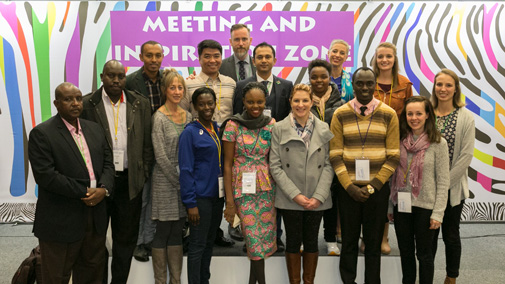The WCPT bursary programme helps physical therapists working in low and lower middle-income countries, and who are a member of a WCPT member organisation or a provisional WCPT member organisation, attend congress.
You can support the bursary programme and help make a lasting impact for a physical therapist and create a legacy in their own country.
Physical therapists in many low and lower middle-income countries have very limited access to high quality continuing professional development, the latest research, or global networking opportunities. This can present challenges to efforts to advance the role and practice of physical therapy to improve the health of global populations.
The bursary contributes towards congress registration fees, accommodation and travel.
For the congress in Cape Town in 2017, WCPT awarded 19 bursaries – which helped people:
- build global connections and networks
- share their knowledge and learning with colleagues
- inform their practice, education, research, and service delivery
- advocate for physical therapy in their home country
- pursue additional continuing professional development opportunities.
Adeniji Oluwatoyin, Margaret Wazakili, and Saurab Sharma are three of the people who were awarded a bursary to attend WCPT Congress 2017 in Cape Town.
Adeniji’s story
Adeniji Oluwatoyin is a Nigerian physiotherapist, employed by the Federal Teaching Hospital, Abakaliki, Ebonyi State.
Adeniji said: ‘WCPT 2017 enhanced my confidence and exposure which helps in influencing professional practice, and sharing information, knowledge, experience and modern trends with colleagues. During the conference, I was able to network and join subgroups in my area of interest – musculoskeletal, ageing, and ergonomics – and connect with potential research partners locally and internationally. My experience at congress helped me through the application stages for a Commonwealth Scholarship. I will be studying for an MSc in Gerontology at the University of Southampton through distance learning and hope to continue to a PhD. I really appreciate the leverage the WCPT bursary gave me to progress my career. The bursary has changed my status, enhanced my career, improved service delivery, helped in contributing to the profession. I am indeed grateful for the opportunity. I hope to be able to help others to receive such opportunity some day and always keep physiotherapy interest everywhere I go.’
Margaret’s story
Margaret is a physiotherapist in Malawi, and the chair of the Physiotherapy Association of Malawi.
Margaret said: ‘It was a great experience to be among physiotherapists with a wide range of academic, clinical and business skills they shared unconditionally. I took part in the Africa Region General meeting, an Indaba session, and a professional seminar on the global workforce. I also chaired a platform session on disability and rehabilitation and presented a poster on the experiences of young people and adults with intellectual disabilities.
‘Having acquired such a rich collection of information from a diverse scientific programme, I created a schedule for sharing different key learning areas with the physiotherapy community in Malawi. Through the Physiotherapy Association of Malawi (PAM) we have revised the constitution and developed a memorandum of understanding with the Malawi Medical Council, developed awareness and fundraising activities, and engaged in research.
‘We’ve also revised the code of conduct and physiotherapy practice in Malawi, and used WCPT policy guidelines to create context-specific professional regulations.
‘After the congress, we formed a working relationship with Cerebral Palsy Africa, a Scottish based charity, which aims to improve rehabilitation services for children with cerebral palsy and other types of neuro-developmental delay. This has led to the launch of a 3-year training programme in which specialist trainers from the UK provided training to 12 physiotherapists in Malawi to ensure they had the skills to handle children with cerebral palsy and knew how to measure for specialised furniture. Community-based rehabilitation workers will also learn hands-on skills and the fabrication of appropriate paper-based technology furniture. This is a great opportunity for young physiotherapists to gain additional and specialised skills in the management of children with cerebral palsy.
‘There is no doubt that attending the WCPT congress in Cape Town has changed the way I work in and outside my practice. I am forever grateful to the WCPT bursary programme that has allowed me to become a better practitioner as well as a leader of my local association. By supporting my participation, WCPT has influenced the whole PAM, as I share my newly gained knowledge and encourage collaboration at national and international levels. Without the bursary programme, there is no way I and many physiotherapists from low and middle income countries would ever be able to attend WCPT congress.’
Saurab’s story
Saurab is an Assistant Professor at Kathmandu University School of Medical Sciences in Nepal. He said:
‘Attending the WCPT congress allowed me to connect with international physiotherapy researchers, creating a relationship with them for a lifetime. As a result of these networks, I have planned research for at least the next five years to supervise physiotherapy research students at Kathmandu University School of Medical Sciences, along with these international research experts. This is a great model of student supervision, which can be adapted by other resource-limited settings, because students will continue to receive supervision of world-class leaders in conjunction with local supervisors. These collaborations will allow me to provide the best possible supervision to Nepalese students and improve the research profile within the country, and ultimately improve student education and patient care. It has also allowed me to identify international experts who can speak at the Nepalese Physiotherapy Conference in Nepal, so that a larger physiotherapy audience can learn from them directly by getting the first-hand knowledge.’



